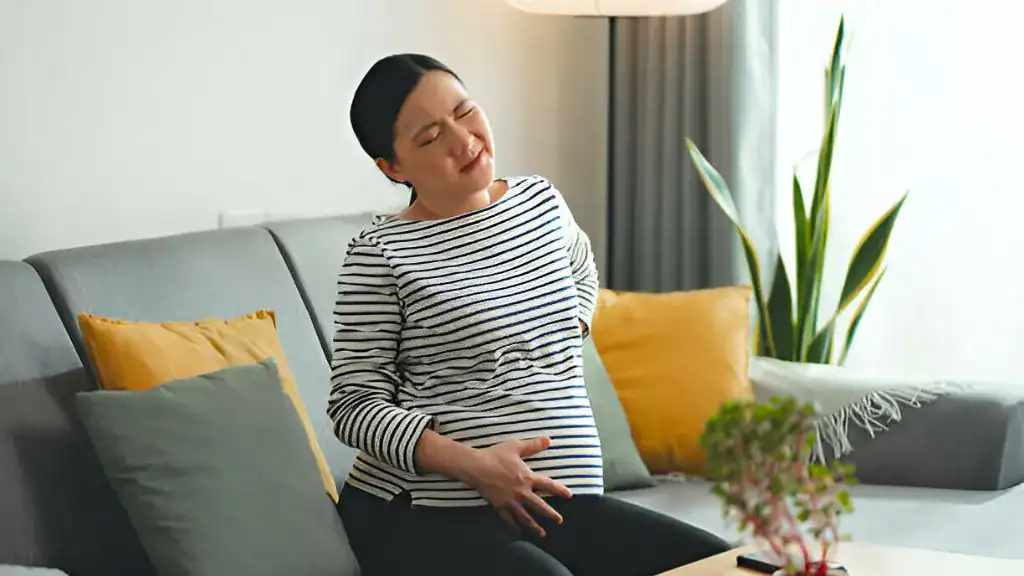
Table of Contents
Pregnancy is magical, they said. Glowing skin, cute cravings, and all the warm fuzzy feelings.
But no one warned you about the “why-do-my-hips-feel-like-they’re-on-strike” part, right?
Hip pain during pregnancy is one of those surprise gifts your body throws in for free—usually in the second and third trimesters, just when bending over or getting out of bed becomes an Olympic event.
From that deep pelvic ache when you’ve been sitting too long…
To the sharp jab that hits when you roll over at 3 a.m. (again!)…
You’re not imagining it—and you’re definitely not alone.
In fact, nearly 1 in 3 pregnant women experience hip pain, pelvic girdle pain, or even sacroiliac joint discomfort as their body stretches, shifts, and prepares for birth. The good news? There are doctor-approved ways to ease that pain—from home remedies to expert-guided relief strategies.
Let’s dive in and decode the hip pain puzzle—because you deserve more support than just another “it’s normal, dear.”
What is Hip Pain During Pregnancy?
Hip pain during pregnancy is that uninvited guest who overstays its welcome—often starting in the second trimester and peaking in the third. It might start as a dull ache near your pelvis or lower back, escalate to sharp, stabbing pains, or even feel like a deep pressure in the hip joints—especially after sitting, sleeping, or standing too long.
This discomfort can range from mildly annoying to downright debilitating. And no, you’re not being dramatic—it’s often linked to real physiological changes like:
- Loosening of joints
- Changes in posture and body alignment
- Increased weight and baby pressure
- And yes, that delightful hormone called Relaxin (we’ll get to her in a bit)
But hip pain isn’t one-size-fits-all. There are a few different types pregnant women experience—and knowing which one’s bugging you is half the battle toward relief.
What Is Pelvic Pain And Pelvic Girdle Pain?
PGP affects nearly 20% of pregnant women and is technically known as pregnancy-related pelvic girdle pain. It’s caused by instability or stiffness in the joints at the front and back of your pelvis, especially as those joints start prepping for labor.
Common symptoms:
- Pain across the hips, lower back, and sometimes down the thighs
- Clicking or grinding sensations in the pelvic joints
- Trouble walking or standing for long
- Sharp jolts while rolling over in bed
PGP is uncomfortable, yes—but it’s not harmful to your baby. However, it can make your daily activities feel like a ninja course.
Sacroiliac Joint Pain
The sacroiliac joints (SI joints) connect your spine to your pelvis, and they’re particularly sensitive during pregnancy. Why? That good ol’ Relaxin hormone softens your ligaments, making those joints looser than usual.
As your bump grows and posture changes, more weight and uneven pressure hits those joints—leading to:
- Lower back pain that feels deep and achy
- Pain when climbing stairs or lifting one leg at a time
- Pain flaring up after standing or walking too long
Round Ligament Pain
This one usually shows up around 14–26 weeks. As your uterus expands, it stretches the round ligaments—cord-like structures that help hold the uterus in place.
The result? Sudden, sharp pain in your groin or lower belly—especially when you sneeze, cough, roll, or stand up too fast.
It usually lasts seconds, but oh boy, does it catch you off guard.
Other Common Types of Hip Discomfort in Pregnancy
- Sciatica Pregnancy Hip Pain: Shooting pain from your lower back to your foot, often caused by the baby pressing on your sciatic nerve. Tingling and numbness included—yay.
- Transient Osteoporosis of Pregnancy: Rare but real. Causes sudden hip pain in the second or third trimester due to temporary bone weakening. Requires medical attention and possibly an MRI.
- Postural Hip Pain: Caused by the imbalance of weight—think carrying toddlers on one side or standing crooked for too long. Add that baby bump and it’s a recipe for ouch.
What Causes Hip Pain During Pregnancy?
Your body is doing something extraordinary—growing a whole human! But that also means a whirlwind of physical changes that can push your muscles, joints, and ligaments into serious overdrive.
Below are the key reasons behind hip pain during pregnancy, from hormonal shifts to skeletal strain.
Relaxin Hormone Hip Pain
First up—Relaxin. This little hormone ramps up in early pregnancy and peaks during the third trimester. Its job? To loosen the ligaments in your pelvis and prepare your body for childbirth.
Sounds useful, right? Sure—except it can also cause:
- Pelvic joint instability
- Increased stress on hip and sacroiliac joints
- Generalized soreness in the lower back, pelvis, and hips
Think of it like loosening the screws on a bridge. It makes the structure more flexible but also less stable. That’s what’s happening to your hips.
Weight Gain & Body Changes
It’s normal (and necessary!) to gain weight during pregnancy—but that extra load puts pressure on your pelvic floor, hips, and lower back.
- The added baby weight shifts your center of gravity forward
- Your posture compensates, which puts a weird strain on hip muscles
- Plus, your joints are looser because of Relaxin—so they don’t handle that strain as well
Doctors typically recommend:
- 25–35 lbs of weight gain for women with a healthy pre-pregnancy BMI
- And for women expecting twins? That number goes up!
Unmonitored weight gain or underlying issues like gestational diabetes, preeclampsia, or malnutrition can make hip pain worse, so always keep your OB-GYN looped in.
Poor Posture & Muscle Imbalance
That slouched-back, belly-forward waddle isn’t just a pregnancy meme—it’s a legit posture issue that causes hip misalignment.
- You may lean more on one hip
- Carry toddlers or bags unevenly
- Or compensate for pain in one area by shifting weight to another
All of this leads to overuse of certain muscle groups and underuse of others—which makes hip pain worse over time.
Tip: Wearing supportive shoes and using ergonomic chairs can help more than you’d think.
Sleep Position
Sleeping on your side is usually the safest during pregnancy—but sleeping the wrong way can put pressure on the hip joint, causing pain to radiate across the pelvis.
Try placing a pillow between your knees to reduce tension. Or invest in a pregnancy pillow like the Snoogle or U-shaped full-body pillows for next-level comfort and alignment.
Sciatica Pregnancy Hip Pain
As your baby grows, your expanding uterus might compress the sciatic nerve—causing what we lovingly call sciatica.
It feels like:
- A shooting pain from your lower back or buttock, down to your leg
- Tingling or numbness in one side of your body
- Worse when you sit, sneeze, or change positions
Good news? Sciatica often improves as the baby shifts downward closer to delivery.
Round Ligament Pain
By the second trimester, your uterus is growing rapidly—and so are the round ligaments that support it. When these ligaments stretch or spasm, you get that sharp, stabbing pain in your lower belly or groin (especially after quick movements).
It’s common and usually harmless—but it can feel like a jolt of lightning in your hips.
Transient Osteoporosis of Pregnancy
Transient osteoporosis causes sudden, intense hip pain, particularly in the second or third trimester. It’s caused by temporary bone loss in the hip joint—possibly due to hormonal and nutritional shifts (calcium and vitamin D deficits).
- An MRI is usually needed for diagnosis
- Recovery often happens after childbirth, but hip fractures can occur in rare cases
It’s treatable with rest, nutritional support, and sometimes physical therapy
Symptoms Breakdown: What Type of Hip Pain Are You Feeling?
Not all hip pain is created equal—and understanding what you’re feeling can help you treat it better. Here’s how to tell the difference:
Pelvic Girdle Pain (PGP)
- Achy or sharp pain across hips, groin, and lower back
- Clicking or grinding in pelvic joints
- Worse when walking, climbing stairs, or turning in bed
Sacroiliac Joint Pain
- Deep, dull ache in the lower back or buttocks
- Pain flares with standing too long or lifting one leg
- Often one-sided
Round Ligament Pain
- Sudden, sharp jabs near the groin or lower belly
- Triggered by coughing, laughing, or changing positions
- Short-lived but intense
Sciatica Pregnancy Hip Pain
- Shooting, burning pain from lower back to foot
- May feel numbness or tingling
- Usually on one side
Transient Osteoporosis
- Deep hip or groin pain
- Trouble walking or standing
- Often misdiagnosed—needs MRI to confirm
Pregnancy Hip Pain Relief: Home Remedies That Actually Work
Hip pain doesn’t have to be your third-trimester sidekick. Here are safe, doctor-approved remedies you can try at home for pregnancy hip pain relief:
Gentle Stretches & Pregnancy Hip Pain Exercises
Pelvic Tilts – Strengthens your lower back and abs
Clamshells & Bridges – Targets hip and glute support
Child’s Pose / Cow Pose – Relieves lower back and hip tension
Pigeon Pose (with support) – Opens up the hips (with OB clearance)
Look up “pregnancy hip pain stretches” on YouTube or try prenatal yoga classes.
1. Heat Therapy
Apply a warm compress or heating pad to your lower back or hip area (15–20 mins max).
Avoid overheating—no hot tubs!
2. Sleep Smarter
Use a pregnancy pillow or regular pillow between knees
Sleep on your left side for better circulation
Elevate your top leg for spinal alignment
3. Use a Maternity Support Belt
Supports your belly + relieves pressure on your pelvis and sacroiliac joints.
4. Prenatal Massage or Acupuncture
Go to a certified prenatal therapist
Helps release tight muscles and improve circulation
5. OTC Pain Relief (Only if Doctor-Approved)
Acetaminophen is generally safe—but always check with your OB before popping any pill.
When to See a Doctor for Hip Pain During Pregnancy
While most pregnancy hip pain is normal (and annoying), some signs mean it’s time to call your doctor ASAP. Here’s what to watch for:
Red Flags That Need Medical Attention
- Persistent hip or pelvic pain that worsens over time
- Pain that limits your ability to walk, stand, or sleep
- Swelling, redness, or fever—may signal an infection
- Pain spreading to thighs or groin before 37 weeks (possible early labor!)
- Unusual vaginal discharge, spotting, or contractions
- Numbness or loss of control in your leg (could indicate severe sciatica)
- You heard or felt a “pop” in your hip or pelvis (rare fracture or ligament tear)
Final Thoughts: Managing Hip Pain During Pregnancy Like a Pro
Pregnancy isn’t just about glowing skin and baby kicks—it’s also about learning to listen to your body. And when your hips start yelling instead of whispering, it’s time to act.
Yes, hip pain during pregnancy is common—thanks to shifting posture, hormonal changes like Relaxin, and your baby setting up camp near your pelvis. But that doesn’t mean you have to suffer in silence.
Here’s your new mom-to-be mantra:
Stretch gently. Sleep smart. Support your hips. Move with intention. And never hesitate to call your doc.
Whether it’s pelvic girdle pain, sacroiliac joint discomfort, or a case of round ligament pain, you’ve got options—from pillows and prenatal yoga to warm compresses and medical guidance.
You’re not just carrying life—you’re navigating pregnancy like a boss. So treat yourself with the same love and care you’re already giving that little one.
Hip Pain During Pregnancy FAQs:
Use a pregnancy pillow between your knees while sleeping, apply a warm compress, and try gentle stretches like Child’s Pose or pelvic tilts for instant relief.
Acetaminophen (Tylenol) is generally safe during pregnancy for hip pain—but always check with your OB-GYN before taking any medication.
A mix of prenatal yoga, warm baths, support belts, and OTC meds like acetaminophen (with doctor’s approval) works best. Also, don’t underestimate good sleep posture!
You shouldn’t try to reduce hip size during pregnancy—your hips widen naturally to support your growing baby. Instead, focus on healthy weight gain, light activity, and toning exercises post-pregnancy (with your doctor’s green light).










